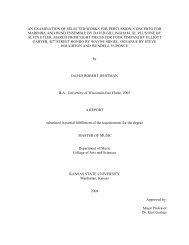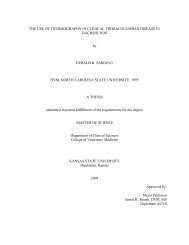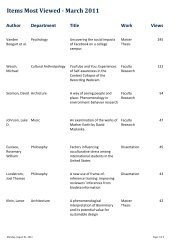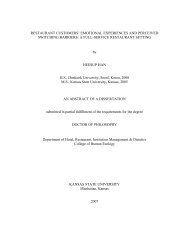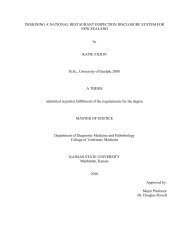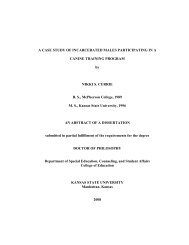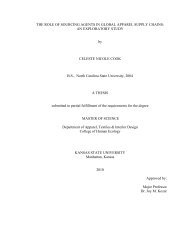SELFISH INTENTIONS - K-REx - Kansas State University
SELFISH INTENTIONS - K-REx - Kansas State University
SELFISH INTENTIONS - K-REx - Kansas State University
Create successful ePaper yourself
Turn your PDF publications into a flip-book with our unique Google optimized e-Paper software.
presented an opportunity for change. Through her work and the work of other women’s rights<br />
advocates, the <strong>Kansas</strong> territorial legislature gave women the right to own property, the right to<br />
sue for divorce, and the right to possess sole custody of their children. Furthermore, the statutes<br />
of the <strong>Kansas</strong> Constitution ended the portion of coverture that children belonged equally to their<br />
mothers and fathers. If custody with father was not in the best interests of the child, the mother<br />
could retain full custody. <strong>Kansas</strong> was one of the first states to give these rights to women. For<br />
women, this step was a shift away from the cloak of coverture and the cult of true womanhood<br />
towards equal rights. From the original territorial statutes to the new state statutes, the law<br />
protected <strong>Kansas</strong> women’s ability to petition for divorce, and as guaranteed in the state<br />
constitution, the right to acquire and possess property.<br />
One woman who was central to the fight for <strong>Kansas</strong> women’s rights to own property and<br />
obtain a divorce was Clarina Nichols. Originally from southern Vermont, Clarina Howard<br />
Nichols traveled to <strong>Kansas</strong> in 1854 with her two oldest sons in order to scout out the <strong>Kansas</strong><br />
territory, leaving behind her second husband and youngest son and daughter. She explained that<br />
she did not want to drag the whole family to <strong>Kansas</strong> if it was not going to be a permanent move.<br />
Clarina came to <strong>Kansas</strong> with the New England Emigrant Aid Society. One reason why they<br />
moved was because Clarina had become frustrated with the stagnant attitude of people in New<br />
England towards women’s rights. In Diane Eickhoff’s biography of Nichols, Revolutionary<br />
Heart, she contends, “Nichols saw that resistance was growing to progressive legislation for<br />
women in her home state. In her mind, New England was comprised by its history, while<br />
<strong>Kansas</strong>—where the laws were yet to be written—could devise its future from scratch.” 58 Nichols<br />
advocated for women’s rights in this new territory. Once she and her sons were settled in<br />
58 Diane Eickhoff, Revolutionary Heart: The Life of Clarina Nichols and the Pioneering Crusade for Women’s<br />
Rights, (<strong>Kansas</strong> City: Quindaro Press, 2006), 99.<br />
21








